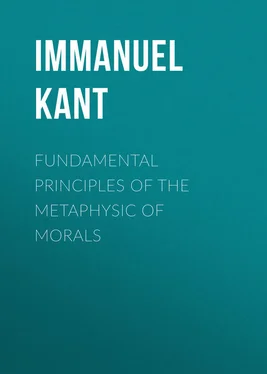Thus is the common reason of man compelled to go out of its sphere, and to take a step into the field of a practical philosophy, not to satisfy any speculative want (which never occurs to it as long as it is content to be mere sound reason), but even on practical grounds, in order to attain in it information and clear instruction respecting the source of its principle, and the correct determination of it in opposition to the maxims which are based on wants and inclinations, so that it may escape from the perplexity of opposite claims and not run the risk of losing all genuine moral principles through the equivocation into which it easily falls. Thus, when practical reason cultivates itself, there insensibly arises in it a dialetic which forces it to seek aid in philosophy, just as happens to it in its theoretic use; and in this case, therefore, as well as in the other, it will find rest nowhere but in a thorough critical examination of our reason.
SEC_2
SECOND SECTION
TRANSITION FROM POPULAR MORAL PHILOSOPHY TO THE METAPHYSIC OF MORALS
If we have hitherto drawn our notion of duty from the common use of our practical reason, it is by no means to be inferred that we have treated it as an empirical notion. On the contrary, if we attend to the experience of men's conduct, we meet frequent and, as we ourselves allow, just complaints that one cannot find a single certain example of the disposition to act from pure duty. Although many things are done in conformity with what duty prescribes, it is nevertheless always doubtful whether they are done strictly from duty, so as to have a moral worth. Hence there have at all times been philosophers who have altogether denied that this disposition actually exists at all in human actions, and have ascribed everything to a more or less refined self-love. Not that they have on that account questioned the soundness of the conception of morality; on the contrary, they spoke with sincere regret of the frailty and corruption of human nature, which, though noble enough to take its rule an idea so worthy of respect, is yet weak to follow it and employs reason which ought to give it the law only for the purpose of providing for the interest of the inclinations, whether singly or at the best in the greatest possible harmony with one another.
Конец ознакомительного фрагмента.
Текст предоставлен ООО «ЛитРес».
Прочитайте эту книгу целиком, купив полную легальную версию на ЛитРес.
Безопасно оплатить книгу можно банковской картой Visa, MasterCard, Maestro, со счета мобильного телефона, с платежного терминала, в салоне МТС или Связной, через PayPal, WebMoney, Яндекс.Деньги, QIWI Кошелек, бонусными картами или другим удобным Вам способом.
A maxim is the subjective principle of volition. The objective principle (i.e., that which would also serve subjectively as a practical principle to all rational beings if reason had full power over the faculty of desire) is the practical law.
It might be here objected to me that I take refuge behind the word respect in an obscure feeling, instead of giving a distinct solution of the question by a concept of the reason. But although respect is a feeling, it is not a feeling received through influence, but is self-wrought by a rational concept, and, therefore, is specifically distinct from all feelings of the former kind, which may be referred either to inclination or fear, What I recognise immediately as a law for me, I recognise with respect. This merely signifies the consciousness that my will is subordinate to a law, without the intervention of other influences on my sense. The immediate determination of the will by the law, and the consciousness of this, is called respect, so that this is regarded as an effect of the law on the subject, and not as the cause of it. Respect is properly the conception of a worth which thwarts my self-love. Accordingly it is something which is considered neither as an object of inclination nor of fear, although it has something analogous to both. The object of respect is the law only, and that the law which we impose on ourselves and yet recognise as necessary in itself. As a law, we are subjected too it without consulting self-love; as imposed by us on ourselves, it is a result of our will. In the former aspect it has an analogy to fear, in the latter to inclination. Respect for a person is properly only respect for the law (of honesty, etc.) of which he gives us an example. Since we also look on the improvement of our talents as a duty, we consider that we see in a person of talents, as it were, the example of a law (viz., to become like him in this by exercise), and this constitutes our respect. All so-called moral interest consists simply in respect for the law.












